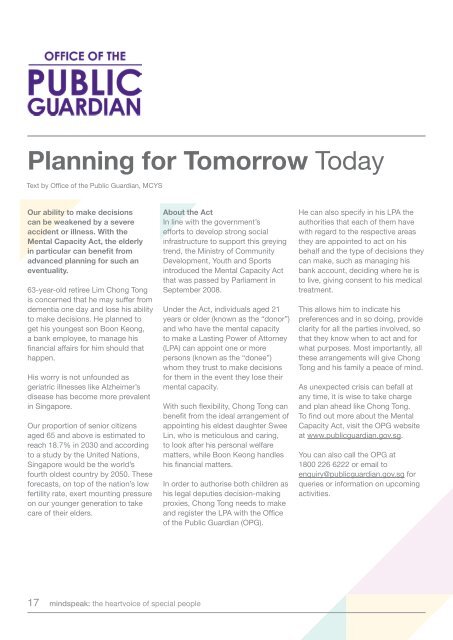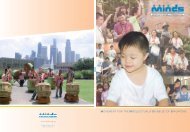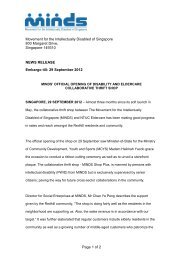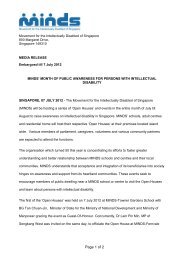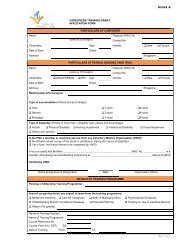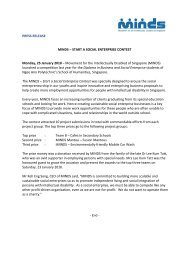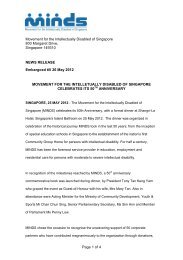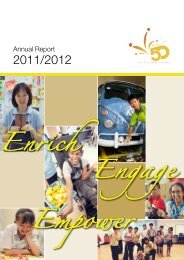Issue No: 1/2010 - MINDS
Issue No: 1/2010 - MINDS
Issue No: 1/2010 - MINDS
You also want an ePaper? Increase the reach of your titles
YUMPU automatically turns print PDFs into web optimized ePapers that Google loves.
Planning for Tomorrow Today<br />
Text by Office of the Public Guardian, MCYS<br />
Our ability to make decisions<br />
can be weakened by a severe<br />
accident or illness. With the<br />
Mental Capacity Act, the elderly<br />
in particular can benefit from<br />
advanced planning for such an<br />
eventuality.<br />
63-year-old retiree Lim Chong Tong<br />
is concerned that he may suffer from<br />
dementia one day and lose his ability<br />
to make decisions. He planned to<br />
get his youngest son Boon Keong,<br />
a bank employee, to manage his<br />
financial affairs for him should that<br />
happen.<br />
His worry is not unfounded as<br />
geriatric illnesses like Alzheimer’s<br />
disease has become more prevalent<br />
in Singapore.<br />
Our proportion of senior citizens<br />
aged 65 and above is estimated to<br />
reach 18.7% in 2030 and according<br />
to a study by the United Nations,<br />
Singapore would be the world’s<br />
fourth oldest country by 2050. These<br />
forecasts, on top of the nation’s low<br />
fertility rate, exert mounting pressure<br />
on our younger generation to take<br />
care of their elders.<br />
About the Act<br />
In line with the government’s<br />
efforts to develop strong social<br />
infrastructure to support this greying<br />
trend, the Ministry of Community<br />
Development, Youth and Sports<br />
introduced the Mental Capacity Act<br />
that was passed by Parliament in<br />
September 2008.<br />
Under the Act, individuals aged 21<br />
years or older (known as the “donor”)<br />
and who have the mental capacity<br />
to make a Lasting Power of Attorney<br />
(LPA) can appoint one or more<br />
persons (known as the “donee”)<br />
whom they trust to make decisions<br />
for them in the event they lose their<br />
mental capacity.<br />
With such flexibility, Chong Tong can<br />
benefit from the ideal arrangement of<br />
appointing his eldest daughter Swee<br />
Lin, who is meticulous and caring,<br />
to look after his personal welfare<br />
matters, while Boon Keong handles<br />
his financial matters.<br />
In order to authorise both children as<br />
his legal deputies decision-making<br />
proxies, Chong Tong needs to make<br />
and register the LPA with the Office<br />
of the Public Guardian (OPG).<br />
He can also specify in his LPA the<br />
authorities that each of them have<br />
with regard to the respective areas<br />
they are appointed to act on his<br />
behalf and the type of decisions they<br />
can make, such as managing his<br />
bank account, deciding where he is<br />
to live, giving consent to his medical<br />
treatment.<br />
This allows him to indicate his<br />
preferences and in so doing, provide<br />
clarity for all the parties involved, so<br />
that they know when to act and for<br />
what purposes. Most importantly, all<br />
these arrangements will give Chong<br />
Tong and his family a peace of mind.<br />
As unexpected crisis can befall at<br />
any time, it is wise to take charge<br />
and plan ahead like Chong Tong.<br />
To find out more about the Mental<br />
Capacity Act, visit the OPG website<br />
at www.publicguardian.gov.sg.<br />
You can also call the OPG at<br />
1800 226 6222 or email to<br />
enquiry@publicguardian.gov.sg for<br />
queries or information on upcoming<br />
activities.<br />
17 mindspeak: the heartvoice of special people


